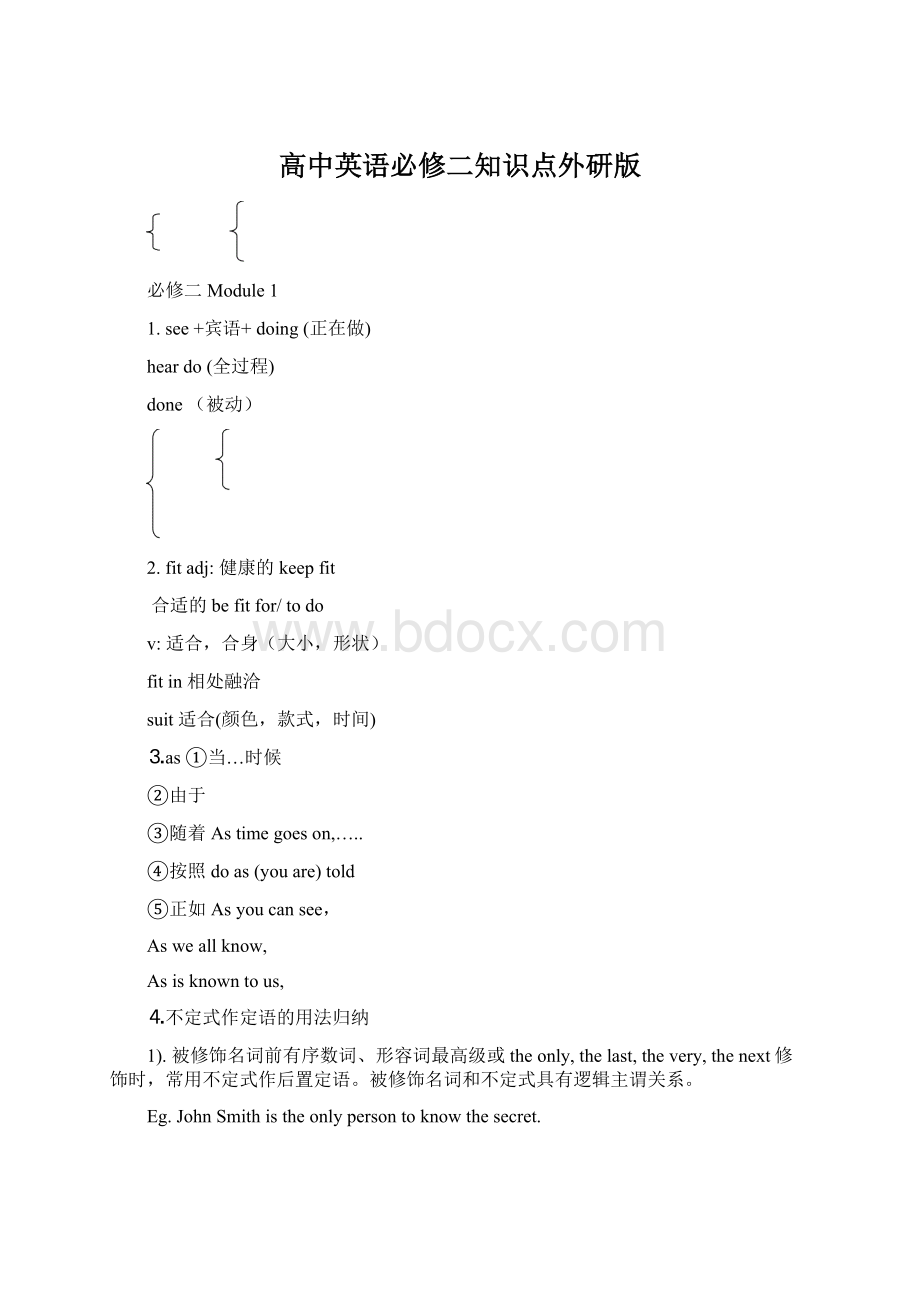高中英语必修二知识点外研版.docx
《高中英语必修二知识点外研版.docx》由会员分享,可在线阅读,更多相关《高中英语必修二知识点外研版.docx(11页珍藏版)》请在冰豆网上搜索。

高中英语必修二知识点外研版
必修二Module1
1.see+宾语+doing(正在做)
heardo(全过程)
done(被动)
2.fitadj:
健康的keepfit
合适的befitfor/todo
v:
适合,合身(大小,形状)
fitin相处融洽
suit适合(颜色,款式,时间)
⒊as①当…时候
②由于
③随着Astimegoeson,…..
④按照doas(youare)told
⑤正如Asyoucansee,
Asweallknow,
Asisknowntous,
⒋不定式作定语的用法归纳
1).被修饰名词前有序数词、形容词最高级或theonly,thelast,thevery,thenext修饰时,常用不定式作后置定语。
被修饰名词和不定式具有逻辑主谓关系。
Eg.JohnSmithistheonlypersontoknowthesecret.
2).表示抽象概念的名词,后面用动词不定式做定语,用于解释中心词的内容,如ability,way,ambition,anxiety,attempt,campaign,chance,courage,decision,determination等。
Eg.shegaveupthechancetogoabroad.
3).如不定式动词是不及物动词作定语时,其后须加一个适当的介词。
例如:
Haveyougotachairtositon?
你有椅子坐了吗?
⒌⑴pay~的短语①注意payattentionto
②拜访payavisitto
③付清,还清(债务);得到回报payoff
⑵buysthforsomemoney用多少钱买某物
sb.spendmoneyonsth./indoingsth.把钱花在…上
sth.cost(sb.)money(某物)花了(某人)多少钱
⒍sure
1).makesurethatdo(时态)
Whenyouleavetheoffice,makesurethatallthelightsareturnedoff.(灯关上了)
2).makesureof/about确保,弄清楚
You’dbettermakesureofthetimeandplaceforthemeeting.(弄清楚开会得时间和地点)
3)besuretodo肯定会,务必Besuretocomeontime.
besureof/about有把握,肯定
Heistosucceed/win.他肯定会赢。
(说话者的主观意见)
Heissureofhissuccess.他确信自己会成功.(主语的观点)
=Heissurethathewillsucceed.
⒎一般将来时态
⑴willdosth/shalldosth单纯表示将来要发生的动作,不强调已经打算好。
begoingtodosth①表示即将发生的或最近打算进行的事。
②表示说话人根据已有的迹象判断将要发生的事情
①It is going to rain.②We are going to have a meeting today.③Iamgoingtoleave.
⑵be to dosth 表示安排、计划、决定、命令或注定要发生的事.
①The boy is to go to school tomorrow
②Thebridgeistobebuiltnextyear.
⑶“be about to + 动词原形” 表示即将发生的动作,或已经打算好马上要去做的动作,意为 be ready to do sth. 后面一般不跟时间状语。
I’m about to leave.
⑷ go , come , start, move, sail, leave, arrive ,stay 等表示位置转移的词可用进行时态表示按计划即将发生的动作。
I’m leaving for Beijing.
⑸ 某些动词(如come, go ,leave, arrive, start, get , stay 等表示位置转移的词)的一般现在时也可表示将来。
表示按照时刻表上规定的时间将要发生,有具体的时间点。
①The meeting starts at five o’clock.②Theplanetakesoffat7:
05am.
注将来时态中,如果单纯表示将来,或即兴动作,用will;
表示早已经打算好了则应该用begoingtodo/betodobeabouttodo/bedoing等。
必修二Module2
1.addictv./n.addictionadj.addictive/addicted
①AdamRouseusedtobeadrugaddict(瘾君子)
②Heisnowfightingagainsthiscocaineaddiction(瘾)
③Heroinishighlyaddictive(使人上瘾的)
④Hersonisaddictedto(沉迷于)computergames.
⑤Cocaineisapowerfullyaddictive(使人上瘾的)drug.
⒉likelyadj.可能的;有希望的,适合的adv.或许,可能
Itislikelythat...很可能...=It’sprobable/possiblethat…
sb./sth.belikelytodo很可能做…=Itispossibleforsb./sth.todo…
Notlikely!
不可能!
才不呢!
(强调否认或拒绝)
①Theyarethelikeliestcandidates.他们是最有可能当选的候选人。
②Heisthelikeliestpersonforthejob.他是最适合做这份工作的人。
③她下月很可能不来。
Sheisnotlikelytocomenextmonth.
④很可能他不会同意。
Itislikelythathewon’tagree.
Thesmokersaretwiceaslikelyasnon-smokerstodevelopAlzheimer’sdisease.
=ThesmokersaremorelikelytodevelopAlzheimer’sdisease
⒊too…to
⑴“too+adj/adv.+to+dosth.”意思是太…而不能.
⑵此外,”too+adj/adv.+forsb.todosth.”意为对某人来说,太….而不能。
⑶Too…to中的too前面有否定词,如never时,表示肯定:
Itisnevertoolatetolearn.活到老,学到老。
【补充】:
"too...to"结构中带有表示某种心情或描绘性的形容词或副词,如ready,eager,satisfied,kind,willing,easy,anxious等加动词不定式结合成一个不可分割的状态、态度、倾向或心情等,并且其后的不定式不是说明too的具体内容,而是修饰形容词,不定式就不再表示结果。
例如:
ComradeLeiFengwastooreadytohelpothers.雷锋同志乐于助人。
⒋…..ever
⑴whatever用法“不管…/无论(…任何…)”------用法和what类似。
❶.引导状语从句:
①.Whateverhappens,youshouldn’tloseheart.
=Nomatterwhathappens,youshouldn’tloseheart.
②.Whatever(great)difficultyyoumeet,youshouldn’tgiveup.
=Nomatterwhatdifficultyyoumeet,youshouldn’tgiveup.
❷.引导名词性从句:
①.Youshouldtellmewhateverhappened.
②.Whateverhedidisforyourgood.
(引导名词性从句时不能用nomatterwhat)
⑵whichever用法“任何一个(件、本…)”(有选择范围)
❶.引导状语从句:
Whichevercomputeryouchoosefromthose,Iwillbuyitforyou.
=Nomatterwhichcomputeryouchoosefromthose,Iwillbuyitforyou.
❷引导名词性从句:
Whicheverbookheboughtfromtheshopwouldbepaidfor.
(引导名词性从句时不能用nomatterwhich)
⑶whoever用法“任何…的人”
❶.引导状语从句:
①.Whoeverseesthedog,pleasecontactMr.Smith.
=Nomatterwhoseesthedog,pleasecontactMr.Smith.
②.Whoeverstudieshard,hecanmakeprogresslater.
=Nomatterwhostudieshard,hecanmakeprogresslater.
❷引导名词性从句:
①.Whoeverstudieshardcanmakeprogresslater..
②.Givethebooktowhoeverisinterestedinit.
(引导名词性从句时不能用nomatterwho)
必修二Module3
⒈Bythetimesb.do/does,…willhavedone;
sb.did,…haddone…
⒉find/make/feel/think/believe/consider+it+adj./n.+todo结构
⑴我们相信通过学习有可能改变人生。
Webelieveitpossibletochangeourlifebylearning.
⑵医生认为你度个假期比较好。
Thedoctorconsidereditbetterforyoutohaveaholidaytakeavocation.
⒊主语+be+adj.+todo结构
1).Whathesaidisdifficulttounderstand.
2).Thebookiseasytoread.
3).Chairiscomfortabletositon.
⒋doyouthink作插入语的用法
你认为他们何时会得出结论?
Whendoyouthinktheywillcometoaconclusion?
你认为我会怎么处理这件事?
HowdoyouthinkIcandealwiththismatter?
其他插入语:
doyoubelieve/suppose/imagine/guess/expect/suggest
注意:
doyousuggest所在的句子要用虚拟语气,即should+do,should可以省略
必修二Module4
1.situation;point;case;experience;story;family这类词充当先行词时常用where或相应介词+which。
⒉happenvi.发生(不能用于被动语态。
)
相关的短语:
sth.happentosb.某事发生在某人身上
happentodo碰巧做…
happentobedoing碰巧正发生
happentohavedone碰巧做过
=Ithappenedthat+从句
⒊关系代词引导的定语从句
1)不用that,只能用which的情况:
a)在引导非限定性定语从句时
Thetree,(whichisfourhundredyearsold,)isveryfamoushere.
b)介词后不能用
Guncontrolisasubject,(aboutwhichAmericanstalkedalot.)
2)不用which,只能用that的情况:
a)在不定代词,如:
anything,nothing,everything,all,much,few,any,little等作先行词时,只用that,不用which。
Finally,thethiefhandedeverything(thathehadstolen)tothepolice.
b)先行词有theonly,thevery,thejust修饰时,只用that。
Heistheveryman(thathelpedthegirloutofthewater).
c)先行词为序数词(thelast)、形容词最高级时,只用that。
.
ThefirstEnglishbook(thatIread)was“ThePrinceandthePauper”byMarkTwin.
d)先行词既有人,又有物时。
Hetalkedabouttheteachersandschools(thathevisited).
e)当主句是以who或which开始的特殊疑问句时,用that以避免重复。
⒋译作“认为”时,有下列句型
considersb./sth.(tobe/as).认为某人是
sb./sth.isconsidered(tobe/as).某人被认为是
sbisconsidered+tohavedonesth.某人被认为做了某事
considerit+adj.+todosth.认为做某事是···
sth/sb
⒌can’tstand+(sb/sb’s)doing
不能忍受beingdone
⒍adoptvt.
1)Theyadoptedmysuggestion.采纳
2)Thepoorchildwasadoptedbythecouple.收养
3)He’snotmyrealfather;I’madopted.收养
⒎tellAandBapart把A和B区分开
tellAfromB_________________
tellthedifferencebetweenAandB说出A和B的不同
totell(you)thetruth说实话
tellastory/joke/lie讲故事、讲笑话、撒谎
⒏⑴可接不定式作宾语的动词有:
afford,agree,aim,attempt,decide,expect,fail,hope,learn,manage,offer,plan,pretend,promise,refuse,want,wish,turn
完成句子
1他买不起这么贵的小汽车。
Hecan’taffordtobuysuchanexpensivecar.
②当老师进来的时候,他假装正在读书。
Whentheteachercamein,hepretendedtobereading.
③他主动提出开车去接我们。
Heofferedtopickusup.
⑵“疑问词+不定式”也可作宾语,这样的动词有teach,show,discuss,decide等。
完成句子
①到目前为止他们还没决定什么时候走.
Sofartheyhaven’tdecidedwhentoleave.
2.他们正在讨论如何解决这个问题。
Theyarediscussinghowtodealwiththisproblem.
Shepractisesplayingthepianoeveryday.
⒐v-ing作宾语
⑴下列动词通常直接v-ing作宾语
finish,enjoy,mind,miss,keep,avoid,imagine,practice,suggest,risk,appreciate,admit等,
①你介意打开门吗?
Doyoumindopeningthedoor?
②她每天练习弹钢琴。
Shepractisesplayingthepianoeveryday.
⑵一些动词词组由“动词+介词”组成的他们的后面也接v-ing作宾语。
常见的有:
lookforwardto,getusedto,putoff,believein,dreamof,thinkof,giveup,insiston,feellike,等等。
我盼望收到你的来信。
I’mlookingforwardtoreceivingyourletter.
Ⅲ.有些动词接不定式和v-ing作宾语意义不同,
forget/remembertodo忘了、记着要去做某事forget/rememberdoing忘了、记得做过某事
regrettodo遗憾要做某事regretdoing后悔做了某事
stoptodo停下来做另一件事stopdoing停止做某事
trytodo努力试图去做某事trydoing试着做某事(看看结果,效果)
meantodo打算要做meandoing意味着
can’thelptodo不能帮着做某事can’thelpdoing禁不住做某事
①我本来打算去,但有事没去。
Ihadmeanttogothere,butsomethingunexpectedhappened.
必修二Module5
⒈congratulate祝贺其宾语是人;
celebrate祝贺,其宾语是物(节日、生日、胜利、成功)
⒉aboard
①.aboardadv.&prep在(船、飞机、火车上)
--Theplanecrashed,killing200peopleaboard.
--Allaboard!
--Welcomeaboard!
②区别:
abroad/board
A.abroadadv.在国外
--Sheoftengoesabroadonbusiness.她经常因公出国。
--I’veneverlivedabroadbefore.
--Hewasfamous,bothathomeandabroad.
B.boardn.木板,董事会
v.上船(或火车、飞机、公共汽车等)onboard=aboard
--Iwrotetheexamplesupontheboard.
--Thereisstillonlyonewomanontheboardofdirectors.在董事会
3.Welcometospace
(1)vt欢迎,迎接
①PresidentHuJintaowillwelcome10headsofstatestoHainanProvinceforthe7thBoaoForAsianextweek.
胡锦涛主席下周将赴海南迎接前来参加亚洲第七届博鳌论坛的10国领导人。
(2)adj.受欢迎的
①Youarewelcometostaywithusaslongasyoulike.
②---Thankyouforthecoffee.
----Youarewelcome.
总结:
Sbbewelcometodosth欢迎某人干某事
bewelcometosth./todosth.“可随意取用某物或做某事”。
Youarewelcome.不用谢,别客气。
⒋连词有:
because,as,since,nowthat,seeingthat,consideringthat,
because通常表示直接的、主要的原因,从句通常置于句尾,也可置于句首,语气比较强回答why提出的问题;
as和since表示明显的、已知的原因,从句通常放在句首;for表示补充说明或推测的原因,从句必须后置,且必须用逗号和主句分开。
(1)because由因导果,because从句是全句最重要的部分,通常它被置于主句之后。
YouwanttoknowwhyI’mleaving?
I’mleavingbecauseI’mfull.
(2)for语气较because要弱得多,只能置于主句之后,对前面主句的内容加以解释或推断
如:
It’smorningnow,forthebirdsaresinging.(很显然,鸟叫不可能是“现在已是早上”的原因。
)
(3)since,as“既然,由于”,它们通常被置于语句之前,但有时却相反。
Seeingallofthechildrenalreadyseated,hesaid,“Sinceeveryoneishere,let’sstart.”
(4)下列情况下只能使用because:
①在回答why的问句时;②在用于强调句型时;③被not所否定时。
(5)一些介词短语同样可以表示原因,这样的短语有:
becauseof,thanksto,dueto,owingto,asaresultof等。
---Hecouldn'twalkbecausehislegwasbroken//becauseofhisbrokenleg
---Theystayedinbecausetheweatherwasbad//becaus